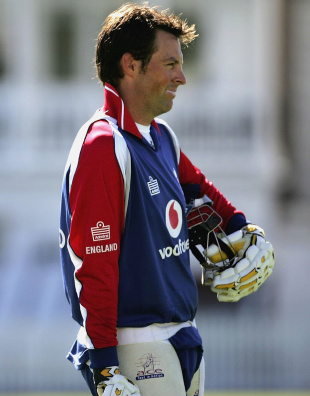Success can dazzle, even blind. It's in failure that those like Jonathan Trott can address their weaknesses
Rob Steen in Cricinfo
March 19, 2014

Jonathan Trott: mired in a personal trough © AFP
What happened to me? Did I lose my talent? Am I ever going to be good again?
Find me a public performer who hasn't echoed Bill Murray's self-pitying, crestfallen lament in Wes Anderson'sThe Life Aquatic With Steve Zissou. Jonathan Trott might have served his cause better had he plumped for such candour and simplicity - it might even have spared him Michael Vaughan's intemperate outburst - but no matter. Depression, stress, burnout, anxiety, panic - variations on the theme of mental unfitness are endless.
"I remember day two or three, it was a bit of a blur, I was getting headaches and all sorts of things and I wasn't eating properly towards the end and that's when the sleep started getting disruptive and emotionally that was when I was worst and it just boiled over. I had nothing left in the tank - mentally and emotionally pretty drained." The number of appearances of the word "and" in the first of those sentences tells us a lot.
As Trott recounted his feelings during last November's Brisbane Ashes Test to Sky Sports viewers, the memories jostled for breathing space; a disorderly queue of negative emotions was being flushed out. Eye contact was strong and certain, but that doesn't mean the scars don't hurt. Amid more measured comments, yes, those references to "crazy" and "nutcase" were supremely insensitive - one of the few things Vaughan was right about in his own insensitive, somewhat hypocritical tirade (well, he did resign the captaincy of his country mid-series). But perhaps Trott felt that distancing himself from a graver clinical condition was a necessary part of his recovery. The message was plain: "I can be good again… I will be good again."
A few years back, "burnout" was a genuine and growing concern: even before the IPL was a glint in the BCCI's eye, multiplying formats and a concertina-like international programme were placing an ever-increasing strain on the leading performers. Then came the domestic T20 eruption; now all bets were off. Now "burnout" was the fear that dare not speak its name. If the players chose to spread themselves even thinner, well, that was their funeral. Frankly, my dear, who gave a damn? Trott's travails should compel us to think anew, with greater compassion. The employers who arranged 61 Tests for their charges over the past five years have far more to answer for on that score than they do over the way they handled his sudden fall from grace.
Older readers might find themselves harking back 40 years to a similar episode involving Geoff Boycott, whose intensity Trott has always seemed bent on emulating, as Mark Ramprakash did before him. The superficial cause was Boycott's repeated humiliations by bowlers of trifling gifts, primarily Eknath Solkar (such is the contempt in which the Yorkshireman holds the late Indian left-arm swinger, the latter is not even accorded the respect of a forename in Boycott's first autobiography, published in 1987).
"Batting to me is more than a mechanical use of techniques," Boycott explained. "I have to feel in a good frame of mind if I am to do well." There was a lot preying on it: difficulties over his benefit season, a rotten start to the summer by Yorkshire, and the usual internecine squabbles at Headingley, let alone the selectors' galling - as he saw it - preference for Mike Denness as England captain over his own claims.
| When nothing is working as it should, as had been the case for Trott since August 2013, convincing oneself that class truly is permanent and that form can only ever be temporary can tax the hardiest of hearts | |||
The tipping point was another cheap dismissal in the first Test at Old Trafford. Nor did it help that it was "glaringly obvious that Denness wanted about as much to do with me as the Black Death". In taking stock, attested Boycott, "I realised, to my horror, that the desire and drive to play for England had gone. There was no satisfaction in it, very little involvement, even less pleasure… I couldn't take it any longer."
He duly informed Alec Bedser, the chairman of selectors, that he was "in no mental or emotional condition to play well for England". Yet when he put the phone down he felt no relief, and certainly no better. By the time he reached Bath, for Yorkshire's match against Somerset, he was "low, confused and physically ill… it might have been stress-related, I really don't know, but it was real and painful enough".
That September, by when his reign as Yorkshire captain was under threat, he did the unthinkable: he turned his country down. "Had anyone mentioned the mere possibility of it to the kid who played in the South Yorkshire back-streets or the young man who battled his way into the Yorkshire and England sides, he would have been invited to go forth and multiply. I would have considered him certifiable. But the culmination of events, circumstances and attitudes was too much to resist. I knew I could not go to Australia and do a good job for England." Not for another three years would he do international battle, yet recover he did, and prosper. Trott can draw hope from that.
In an interview published in the Times last Saturday, Rosabeth Moss Kanter, a Harvard professor billed by Rick Broadbent as an "expert on losing streaks", spelled out the commonalities linking sport and the world beyond. "In a losing streak everything deteriorates. There is often infighting and a lack of desire to show up for work because the situation is so unappealing. You see it in inner-city communities too, where neighbourhoods form gangs and fight against each other rather than working together." In an unusually perceptive moment, the all-too aptly named footballer Robbie Savage recalled the "soul-destroying" nature of a horrendous streak for Derby County not only robbing him of enthusiasm but reducing him to hatred for the game he once adored.
Trott, though, was mired in a personal trough. He'd gone 18 Test innings without a century before (and not that long ago). He'd also gone four ODIs without reaching 30 before, twice. This time, both happened concurrently, gnawing at his marrow.
One of the chief advantages of playing a uniquely multi-format sport is that success in one discipline can refuel another, or even persuade you to focus exclusively on a single discipline, the better to spare yourself all that angst and pain. But when nothing is working as it should, as had been the case for Trott since August 2013, convincing oneself that class truly is permanent and that form can only ever be temporary can tax the hardiest of hearts (unless, of course, your scorebook entry reads DG Bradman or SF Barnes).
****

| |||
Repeated exposure to failure can be our undoing, but it can also reinvigorate. As that hoary old saying goes, what doesn't kill us makes us stronger. For professional sportsfolk, unlike most mortals, failure, however relative, is transparent and statistical, sometimes tweetworthy, always inescapable. For all of us, what counts is how we cope with it, and the way we heed its lessons.
The challenge to those recuperating from a setback is whether to risk the self-diminishing agonies of failure again. All the more reason, then, to salute those who take that risk for our amusement, and when there is little or no apparent need. Witness Rafa Nadal, whose improbable comeback from a career-threatening injury has been immeasurably more successful than the tennis writers and even his doctors predicted.
Had that regal racqueteer's stomach churned at the prospect of failure, he would have taken one of two courses: he would never have dared return to the court (it's not as if he needed the pesetas or kudos) or, in so doing, that renowned courtly behaviour would have lapsed. Neither happened, almost certainly because Nadal possesses the quintessential prerequisite of all champions: those competitive fires still burned. Has a sporting figure ever treated those twin imposters with quite such startling equanimity?
We make much of self-assurance as the most priceless of assets. Not only does it embolden, it also enhances the power of bluff. Confidence, achievement and reputation form a virtuous circle; how often do off-form achievers prevail purely by dint of repute? Ian Botham managed just 40 wickets in his last 23 Tests, and most of those owed more to name than skill. That confidence may or may not be innate; for those whose work exposes them to daily ordeals by competitive fire, in public view, it can certainly be mercurial. One numbing or humbling failure at an inopportune time can do more to deflate it than a hundred triumphs can buoy it. It depends on how deep it runs.
Yet strength can only be enhanced by reducing or eradicating vulnerability; by logical extension, therefore, failure can be more important than success. Failure means those glances in the mirror are likelier to be stares - broodier, more searching, less self-deluding. Weaknesses are likelier to be addressed, lessons learned. Success, conversely, can dazzle, even blind. It can also deter acknowledgement of the influence exerted by sheer blind luck, an ingredient never more potent than in the competitive arts. Perhaps only the tiny ranks of the doubt-free actively desire failure - as motivation, as a counter to complacency - but maybe that's what keeps us all going. Should we fear it? No, but a spot of constructive loathing can come in handy.
Bill Murray/Steve Zissou relocated his mojo - or at least a semblance of it - with a gun, saving his crew from a band of murderous pirates. A less violent loosening-up might do Trott a power of good.

